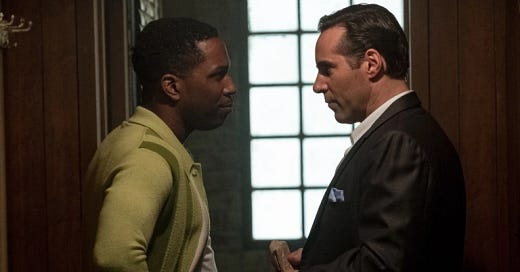Spoilers for The Many Saints of Newark ahead.
Most of my friends spent quarantine either bingeing the series for the first time or doing a rewatch, so it was the perfect time for a Sopranos prequel to come along. I attempted the later, mostly because my mother canceled HBO before the final season aired and I have still to this day not seen it. I'm not sure why I could just watch the last handful of episodes without watching the entire series from the pilot again, but my idiosyncrasies make me a completist at times (and other times not — I started Breaking Bad from the third season and I am perfectly fine with that). Still, I enjoyed The Sopranos immensely when I watched it and it's understandable why the prestige drama has become the apex of prestige dramas (mine is Mad Men, but The Sopranos is up there). It took the incredibly popular mob drama genre and turned it into a contemplative, at times soapy, psychosexual television show. Despite not finishing my quarantine watch, I was looking forward to The Many Saints of Newark.
I shouldn't have!
Whereas The Sopranos turned the genre on its head by embracing the humanity in Tony Soprano and his family — quite literally through his repeat therapy sessions with Dr. Melfi — this prequel was… a mob film. At a certain point, we've seen all the beats there are to see and the lure here was the promise of watching Tony become the mob boss we enjoyed watching in the 2000s. Nostalgia is a powerful drug. I'd watch a Caroline in the City prequel at this fucking point. But the film is less interested in Tony's ascent to power as it is in his uncle Dickie Moltisanti's flirtation with his father's Italian wife, who he murders his father for abusing, then fucks, then has Christopher Moltisanti (Michael Imperioli's iconic character, who I didn't know was killed in the final season but honestly, makes sense!) with, then murders because she fucks a Black man played by Leslie Odom Jr.
This film was period piece nigga mad libs. When your first scene with Black people has the line, "The numbers are the only way Black folks got to get out of this sinkhole city," you're not really trying at all. That's the kind of dialogue I was writing for my Black characters in my first playwriting class because white classmates condition you to think that's how all Black people constantly talk to each other.
The film is awfully concerned with race relations in a way the original series wasn't, but the thing about nostalgia is it should give you what you remember receiving. I don't need The Sopranos to have Black people in it. I don't need scenes where a Black person has to defiantly respond to being called a nigger by an Italian mobster. I just want to watch some Italians killing people and then feeling bad about it and wondering if they're evil people before they go and do it again. The beauty of The Sopranos is that it was extremely relatable. We are who we are. Most people never truly change, despite the strides we make to become better people. Tony Soprano had flashes of humanity, but he wasn't a good person.
There's no need to rewrite the past sins of The Sopranos. My mother and I enjoyed watching the series despite there being no Black people in it the first time and I would’ve enjoyed it just fine this time around without them in it. I can watch Ellen Pompeo’s favorite movie American Gangster whenever I want, it’s streaming on Peacock for free.





David Simon was the showrunner for The Wire